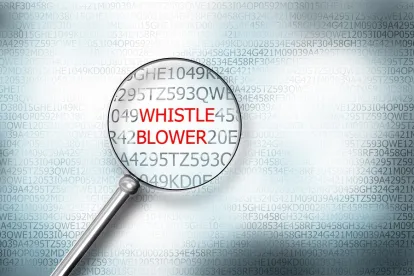In the wake of “fake news” and the renewed focus on the incredible power of American technology giants, monopolistic and anticompetitive behavior across industries has been thrust into the spotlight once more. Many companies have seized upon the radical transformation of the American economy brought on by the COVID-19 pandemic to further entrench themselves as the sole option for the American consumer. The Apple Tax. The dominance of Family Dollar and Dollar General. Lack of rural broadband access. And, of course, Google’s 87% market share in the search engine business. No one wants to punish companies for achieving success through legitimate, competitive means, but the federal government needs additional tools to combat anticompetitive behavior during the era of high-technology, especially given the penchant many of these companies have for retaliating against employees who stand in their way.
Since 2011, the Government Accountability Office (“GAO”) has recognized that the employees of wrongdoers are reluctant to come forward to assist the Department of Justice (“DOJ”) in its enforcement actions, and the GAO’s interviews with stakeholders revealed strong support for the addition of civil whistleblower anti-retaliation protections to the Antitrust Criminal Penalty and Reform Act (“ACPERA”). DOJ officials would not take a stance in favor or against such an addition, claiming that they were unsure of a need for these protections and that it would be inappropriate for them to propose new legislation. An existing statute which imposes criminal penalties for retaliating against employees who assist in criminal investigations theoretically provided some deterrence against retaliation, but the DOJ had never investigated or prosecuted cases involving retaliation against antitrust whistleblowers. However, the GAO’s review of published court decisions revealed that antitrust whistleblowers who suffered retaliation attempted to seek relief through Section 4 of the Clayton Antitrust Act but were generally unsuccessful due to lack of antitrust injury or standing. In 2013, 2015, and 2017, the Senate passed bills which would have added these protections to ACPERA, but the House rejected these amendments.
The Criminal Antitrust Anti-Retaliation Act of 2020
In light of the limited protections for antitrust whistleblowers, on December 23, 2020, then President Donald Trump signed into law the Criminal Antitrust Anti-Retaliation Act (“CAARA” or “the Act”). Under CAARA, “no employer may discharge, demote, suspend, threaten, harass, or in any way discriminate against” employees, contractors, subcontractors, and agents of employers (“covered individuals”) who report or cause to be reported criminal violations of antitrust laws or who participate in proceedings by the federal government regarding criminal antitrust violations. These protections extend to reporting on other criminal actions perpetrated in conjunction with potential antitrust violations and on criminal actions such as obstruction of justice perpetrated in conjunction with an investigation by the DOJ into potential antitrust violations. Critical to any government investigation is reliable information, and, as we have seen with the Securities and Exchange Commission (“SEC”), Commodity Futures Trading Commission (“CFTC”), and Internal Revenue Service (“IRS”) whistleblower programs, among many others, it appears likely that the protections provided by CAARA will encourage many whistleblowers to come forward to assist the government in protecting the American public, either by tipping off the government to the illegal conduct or participating as witnesses in investigations of that conduct. Given that individuals who violate antitrust laws can face up to ten years in prison and fines up to $1 million per offense (up to $100 million per offense for companies), the threat of whistleblowers coming forward should incentivize companies to develop more robust internal antitrust compliance regimes to address these concerns without government involvement and before a potential whistleblower feels compelled to act. The key role that whistleblowers can play in this area of law enforcement is demonstrated by some recent antitrust actions. The 2020 antitrust actions against a South Korean bid rigging conspiracy involving U.S. military fuel supply contracts (which resulted in an over $200 million recovery, the largest ever antitrust-related False Claims Act (“FCA”) recovery) and the 2000 antitrust actions against various companies conspiring to rig bids for USAID construction contracts in Egypt would never have been brought were it not for whistleblowers reporting these violations in connection with related FCA actions.
Protections for Antitrust Whistleblowers
To receive protection under CAARA, an employee needs to have only a “reasonable belief” that a potential antitrust violation has occurred, a common standard in whistleblower laws. This standard requires that the employee actually believe a violation occurred (a subjective component) and have some kind of evidence that would lead a reasonable person with the same or similar experience in that situation to believe a violation had occurred (an objective component). The reasonable belief standard weeds out reporting based solely on conjecture while encouraging whistleblowers to come forward even if they do not have “smoking gun” evidence that their employers violated the law. To be covered, protected whistleblower activity requires that the employee report his or her reasonable belief to government officials, to a supervisor, or to a designated internal investigator. As in other whistleblower programs, participation in the violation is not an absolute bar to protection, thereby ensuring that unwitting participants who eventually recognize and report unlawful acts are not left out in the cold. Only covered individuals who planned and initiated the violation or another criminal act in conjunction with a potential violation, or engaged in obstruction efforts are barred from receiving this anti-retaliation protection. Before CAARA was enacted, under the DOJ Leniency Program, those engaged in criminal antitrust violations who came forward to report those violations would receive leniency in any criminal cases that may be brought against them in the course of an investigation. But there were no special protections for innocent participants in wrongdoing, and this disconnect – protecting wrongdoers but not innocent individuals reporting violations – helped spur the development of these standards in CAARA.
Mandatory Arbitration Agreements for Resolving Retaliation Claims
CAARA provides for a 180-day statute of limitations within which the covered individual must file a complaint with the Secretary of Labor through the Occupational Safety and Health Administration (“OSHA”), and, 180 days after filing with OSHA, the covered individual can file in federal court. Notably, unlike the anti-retaliation provisions of the Sarbanes-Oxley Act, CAARA does not prohibit pre-dispute arbitration agreements as the mechanism for resolving retaliation claims stemming from the Act, so, through mandatory arbitration provisions, employers may be able to chill whistleblowers from coming forward because they know that forum will not be as hospitable to their claims. Employment arbitration generally has a known bias in favor of employers. While the data available on the outcomes of arbitration is limited given arbitration’s inherent confidentiality, meaning that drawing conclusions from this data can be difficult, limited empirical studies suggest that arbitration can act as a shield for employers. Alexander Colvin, “An Empirical Study of Employment Arbitration: Case Outcomes and Processes,” Journal of Empirical Legal Studies, 8, 1, 6, 13, 18-20 (2011) (showing that employers who repeatedly arbitrate claims have half the loss rate and pay half as much in awards compared to employers who only arbitrate once). Employers, as repeat players, are more familiar with the arbitral process, have more resources than employees to devote to arbitration, and can select arbitrators who have ruled in their favor in the past. Additionally, arbitrators themselves may be biased towards employers since employers tend to pay arbitration fees and will be more likely than an employee to require the arbitrator’s services in the future. Employees know that they are less likely to succeed on their claim than they would be in court, so they may not pursue claims in light of their arbitration provisions.
Protected Violations of Antitrust Law Limited for Whistleblowers Reporting Wrongdoing
True to its name, CAARA obviously protects employees who blow the whistle on violations of “antitrust laws.” Antitrust violations encompass a variety of actions, including, but not limited to, bid-rigging conspiracies between competitors, collusion between competitors to fix prices, anticompetitive mergers and acquisitions, and litigation – often intellectual property litigation – intended to suppress competition. Despite this wide range of illegal anticompetitive behavior, under CAARA, the protected range of violations of antitrust law is much more limited. Whistleblowers only receive retaliation protections if they report violations of Sections 1 and 3 of the Sherman Antitrust Act (15 U.S.C. §§ 1 & 3). Sections 1 of the Sherman Act is focused exclusively on collusion between companies – “Every contract, combination in the form of trust or otherwise, or conspiracy, in restraint of trade or commerce among the several States, or with foreign nations, is declared to be illegal.” Section 3 merely applies Section 1 to the District of Columbia and United States territories. Classic examples of illegal actions under Section 1 include bid-rigging and market allocation agreements where competitors divide up a market, often based on geography (e.g. agreeing to sell products in New York but not New Jersey). Furthermore, while the Clayton Antitrust Act – a purely civil statute with no criminal penalties – is not covered by CAARA, most of the illegal behavior enumerated by the Clayton Act (e.g. anticompetitive merger agreements) could also be prosecuted under Section 1 of the Sherman Act as a “contract, combination . . ., or conspiracy.” CAARA does not cover reports of violations of Section 2 of the Sherman Act, which prohibits unilateral actions taken to create a monopoly.
The effect of the limited range of protected conduct under CAARA leaves some striking gaps. For example, unilateral price discrimination – charging different customers different prices in order to drive out competition – is illegal under the Clayton Act but would not be illegal under Section 1 of the Sherman Act as it does not involve an agreement between competitors. Furthermore, because the Supreme Court held in Copperweld Corp. v. Independence Tube Corp., 467 U.S. 752 (1984), that the Sherman Act does not cover collaboration between entities under a single corporate umbrella, anticompetitive collusion between subsidiaries is permissible under Section 1 of the Sherman Act (and therefore outside the scope of CAARA). For instance, should Berkshire Hathaway’s various manufactured housing subsidiaries choose to collude on setting prices for mobile homes that would be permissible under Section 1 and could only be potentially actionable under Section 2 of the Sherman Act, which prohibits single firm conduct intended to create or maintain a monopoly. Similarly, the use of patent litigation or certain refusals to share essential patents – forms of potentially monopolistic single firm conduct otherwise prosecutable under Section 2 of the Sherman Act – are also not actionable under Section 1 and reporting on these kinds of Section 2 violations would not afford a whistleblower any protections. Other forms of anticompetitive behavior, such as “gun jumping” – prematurely transferring ownership, actually or functionally, through a merger or acquisition before the government has reviewed the transaction – under the Hart-Scott-Rodino Act or violations under other non-Sherman Act antitrust laws, may also not be covered by CAARA since it is unclear to what extent these behaviors are also governed by Section 1 of the Sherman Act. As a result, despite encompassing reporting on a substantial subset of anticompetitive conduct, CAARA still has gaps in its coverage which would leave many would-be whistleblowers unprotected.
Improving on the Criminal Antitrust Anti-Retaliation Act
On balance, this Act represents an important, though limited, step forward for employee rights since individuals seeking to do the right thing by the American people ought to be protected from the malicious retaliatory impulses their employers may have and this law furthers that essential principle. Without these brave individuals who risk their livelihoods by speaking out, many illegal and dangerous actions would be simply swept under the rug. However, improvements could be made to CAARA, all of which would encourage more reporting to government officials or internal supervisors regarding conduct that harms the American people. In the ever-changing fast-paced modern marketplace, regulatory officials need more information in order to ensure that markets remain competitive.
First, CAARA should protect reporting on a broader range of criminal violations of antitrust law, including unilateral conduct that violates Section 2 of the Sherman Act. Although some defend such conduct and believe monopolies are self-correcting and great drivers of innovation, these practices are illegal under the Sherman Act and whistleblowers who report them should be protected from retaliation.
Second, Congress should expand CAARA to include civil antitrust violations. Many federal whistleblower programs already encompass not only criminal acts but also civil violations of laws and regulations. While Section 1 of the Sherman Act’s category of “[e]very contract, combination in the form of trust or otherwise, or conspiracy, in restraint of trade or commerce” is sufficiently broad to capture within Section 1 of the Sherman Act most of the multi-actor enumerated practices in the Clayton Act, unilateral price discrimination and the other actions described above are excluded. Additionally, proving a criminal violation of antitrust laws is substantially more difficult that proving a civil violation, making civil antitrust enforcement an essential part of the American antitrust regime. While the reasonable belief standard shields employees who mistakenly – but based on some evidence – believe that their employer has violated criminal antitrust laws, an employee may feel more comfortable coming forward as a whistleblower if she only has to allege a civil violation of law, thereby allowing the government to more efficiently regulate markets. Political pressure to expand protections for antitrust whistleblowers has already been building in the wake of CAARA. Senator Amy Klobuchar has introduced the “Competition and Antitrust Law Enforcement Reform Act.” In addition to covering Section 2 of the Sherman Act, this law would also cover whistleblowers reporting Clayton Act violations by adding Section 5 of the Federal Trade Commission Act (15 U.S.C. § 45), which authorizes the Federal Trade Commission to enforce civil antitrust violations, to the list of applicable antitrust laws.
Third, the law should include a ban on pre-dispute arbitration for antitrust whistleblower retaliation claims. Congress passed this law in the wake of furor over the incredible power of large technology companies and the manner in which they wield that power. These companies – like those in many other industries – often have arbitration provisions in their onboarding documents, and employees typically have no choice but to accept these provisions. Given the known bias arbitration has in favor of employers, allowing them to use arbitration to shield themselves from retaliation claims will have a chilling effect on a potential whistleblower’s willingness to come forward.
Fourth, Congress should create a whistleblower award program for CAARA. For criminal antitrust violations, the government can fine companies up to $100 million and individuals up to $1 million. If the law were expanded to include civil violations, the government would be able to collect more in judgements. The SEC, CFTC, and IRS whistleblower programs each have an award program, and these programs have incentivized whistleblowers to come forward, as shown by the general increase in reporting, award claims, and amounts collected over the last ten years or so. In fact, the IRS whistleblower program only truly became an effective tool for recovering lost tax revenue once Congress implemented a mandatory award program. These programs make awards within a statutory range (e.g. the CFTC makes awards between ten and thirty percent of the amount recovered), and the exact percentage is determined by a number of factors, including value of the information provided, ongoing participation in the investigation, delay in reporting, and participation in the violations, among others. A similar schema could be easily implemented for antitrust whistleblowing, and, in fact, Senator Klobuchar’s “Competition and Antitrust Law Enforcement Reform Act” would create an award program modeled after these other whistleblower protection laws. Given the vital information these whistleblowers can provide prosecutors and regulators, they ought to be rewarded for the incredible personal risk these individuals undertake for the sake of the public.
The Biden administration has been handed an unexpected gift from the Trump administration, a brand new tool to help bring antitrust compliance into the twenty-first century. It may take a few years for the public to see the benefits from the Criminal Antitrust Anti-Retaliation Act, as has been the case for other federal whistleblower programs, and Congress ought to take the above steps to strengthen CAARA’s protections and broaden its scope. However, for now, at least some employees and their families will be able to breathe a sigh of relief if they decide to take a stand against illegal conduct that degrades the American competitive spirit and enriches the few at the expense of the American people.




 />i
/>i
